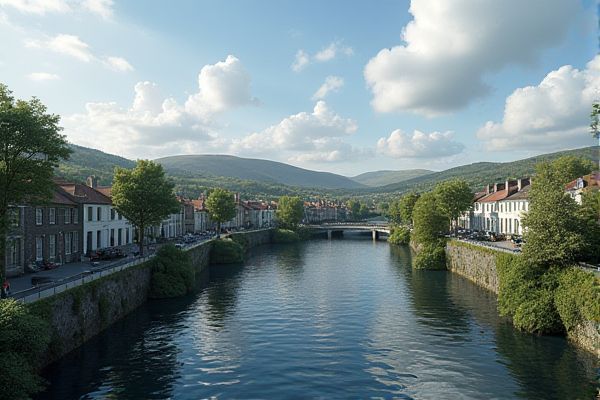
Safety and crime rates in Ireland: Low overall crime rates. Safe for solo travelers. Violent crime is rare. Petty theft in tourist spots. Gardai handles law enforcement. Community policing initiatives active. Roads generally safe for driving. Emergency number is 112 or 999. Neighborhood Watch programs exist. Rural areas typically safer than urban.
Low overall crime rates.
Ireland boasts a remarkably low overall crime rate, highlighted by a homicide rate of only 0.5 per 100,000 inhabitants. This figure is significantly lower than the OECD average of 2.6, underscoring the country's commitment to safety. Additionally, an impressive 76% of people in Ireland report feeling safe walking alone at night, surpassing the OECD average of 74%. These statistics position Ireland as a secure nation, contributing to its citizens' high quality of life. For further insights on this topic, the OECD Better Life Index provides a comprehensive guide to global safety standards and more.
Safe for solo travelers.
Ireland is a safe country for solo travelers, with a low crime rate and a welcoming environment, especially due to its friendly locals and secure public transport. Solo female travelers also find Ireland to be one of the safest European destinations, with the advice to exercise common sense and remain aware of their surroundings. For more detailed insights on traveling alone in Ireland, the Ultimate Guide to Solo Traveling in Ireland is an invaluable resource that provides essential tips and recommendations.
Violent crime is rare.
Despite the recent surge in murder rates, with a nearly 100% increase in the last year largely driven by domestic killings and femicides, violent crime remains relatively rare in Ireland, especially when compared to historical trends and other European countries. However, the current increase is a significant concern, particularly in the context of domestic violence.
Petty theft in tourist spots.
Petty theft, particularly pickpocketing and bag snatching, is the most common crime affecting tourists in Ireland, often occurring in popular tourist areas like Dublin's Temple Bar, Grafton Street, and O'Connell Street, as well as on public transportation and crowded spots like Connolly Railway Station. For more information on travel safety, you can visit the Travellers Worldwide website to learn about safety tips and precautions when visiting Ireland.
Gardaí handles law enforcement.
The Garda Siochana, Ireland's National Police Force, is tasked with a comprehensive range of policing duties, encompassing crime prevention, detection, and investigation, alongside responsibilities in traffic management and national security. This force is strategically organized into regions, divisions, and districts, maintaining a robust emphasis on community policing. Oversight by the Policing Authority ensures that law enforcement remains both effective and accountable. For more detailed information, you can visit the Garda Siochana page on Citizens Information.
Community policing initiatives active.
Community policing initiatives in Ireland include Neighbourhood Watch, Community Alert, and Joint Policing Committees, which focus on crime prevention, problem-solving, and building trust between the community and the Garda Siochana. Efforts such as visible foot patrols, public meetings, and liaison with citizens are employed to enhance community safety and quality of life.
Roads generally safe for driving.
Despite Ireland's generally strong road safety record, with a mortality rate of 28 road fatalities per million inhabitants in 2019, which is well below the EU average, recent trends reveal a worrisome rise in road deaths. This surge is attributed to factors such as intoxicated driving, speeding, and driver distraction. For further insights into why Ireland is currently bucking the European trend, it becomes essential to understand these underlying issues and work toward enhanced road safety measures.
Emergency number is 112 or 999.
In Ireland, the universal emergency numbers are 112 or 999, which connect you to the police (Gardai), ambulance, fire services, and other emergency responders in case of medical emergencies, accidents, fires, or criminal activity. For a comprehensive list of emergency services and their contact numbers, it's crucial to refer to the Guide to Emergency Services Contact Numbers in Ireland for accurate and up-to-date information. Having this guide readily available ensures peace of mind, knowing that help is just a call away when needed.
Neighborhood Watch programs exist.
Neighbourhood Watch in Ireland is a crime prevention program that partners local communities with the Gardai to report suspicious activities, improve home security, and foster community spirit, aiming to reduce crime and create a safer environment, particularly in urban areas. For more detailed information about how such programs work, visit the Community Crime Prevention Programmes page. These initiatives are crucial in building trust and cooperation between residents and law enforcement, leading to more vigilant and connected neighborhoods. By focusing on the safety and security of the community, Neighbourhood Watch not only addresses immediate concerns but also contributes to long-term peace of mind for all involved.
Rural areas typically safer than urban.
In Ireland, crime is overwhelmingly an urban phenomenon, with rural areas having extremely low victimization rates except in areas close to major urban centers like Dublin, indicating that rural areas are generally safer than urban areas.
